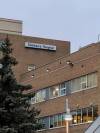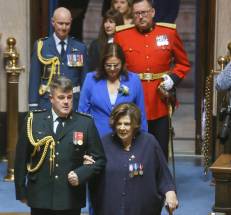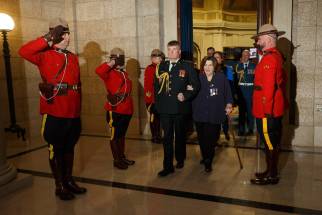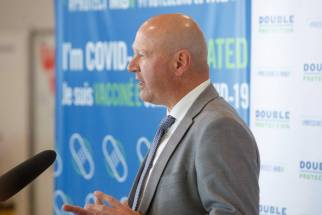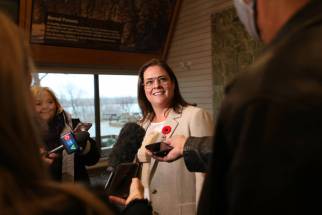Manitoba not looking at mandating masks: Roussin Despite crisis straining Children’s Hospital, chief public health officer says province maintaining status quo
Read this article for free:
or
Already have an account? Log in here »
To continue reading, please subscribe:
Monthly Digital Subscription
$0 for the first 4 weeks*
- Enjoy unlimited reading on winnipegfreepress.com
- Read the E-Edition, our digital replica newspaper
- Access News Break, our award-winning app
- Play interactive puzzles
*No charge for 4 weeks then price increases to the regular rate of $19.00 plus GST every four weeks. Offer available to new and qualified returning subscribers only. Cancel any time.
Monthly Digital Subscription
$4.75/week*
- Enjoy unlimited reading on winnipegfreepress.com
- Read the E-Edition, our digital replica newspaper
- Access News Break, our award-winning app
- Play interactive puzzles
*Billed as $19 plus GST every four weeks. Cancel any time.
To continue reading, please subscribe:
Add Free Press access to your Brandon Sun subscription for only an additional
$1 for the first 4 weeks*
*Your next subscription payment will increase by $1.00 and you will be charged $16.99 plus GST for four weeks. After four weeks, your payment will increase to $23.99 plus GST every four weeks.
Read unlimited articles for free today:
or
Already have an account? Log in here »
Hey there, time traveller!
This article was published 15/11/2022 (1119 days ago), so information in it may no longer be current.
Manitoba isn’t changing its guidance on face masks — despite calls to strengthen its messaging — as an early surge in respiratory viruses puts further strain on the struggling health-care system.
Dr. Brent Roussin, the province’s chief public health officer, on Tuesday encouraged Manitobans to be up to date on their COVID-19 and flu vaccines while taking other precautions.
He isn’t going as far as his Ontario counterpart, who is “strongly” recommending people wear face masks in indoor public places to ease the burden on overwhelmed pediatric units.
“Our focus is to really message on all of the layers of protection we have — vaccines, staying home when ill, hand washing, certainly masks are an option for people to use,” Roussin told the Free Press.
“We’re certainly not looking at mandating it, and really are approaching it on the levels of protection people can have.”
Canada’s chief public health officer, Dr. Theresa Tam, has encouraged people to wear masks in indoor public places, citing the rise in viruses and waning immunity to COVID-19.
Some physicians want the province to bring back a mask mandate to reduce the spread of viruses and help hospitals cope with a spike in respiratory syncytial virus and influenza A.
Combined with COVID-19 and other illnesses, the rise in infections has overwhelmed the emergency department at Children’s Hospital in Winnipeg.
Roussin suggested a long road could be ahead, although it’s difficult to predict when the situation will peak.
“We have to plan for ongoing transmission of both RSV and influenza A,” he said. “We have things at our disposal to limit that, especially vaccines with influenza A and all those other layers of protection.
“A typical respiratory virus season will typically last many months, and so we have to be preparing for that, but only time will tell what it will look like.”
The other “layers” include staying home when sick, hand washing and masks, said Roussin.
MIKE DEAL / FREE PRESS FILES Dr. Brent Roussin said it’s hard to know why the respiratory virus season started early, but it mirrors that of Australia, where there was an early high peak of influenza A.
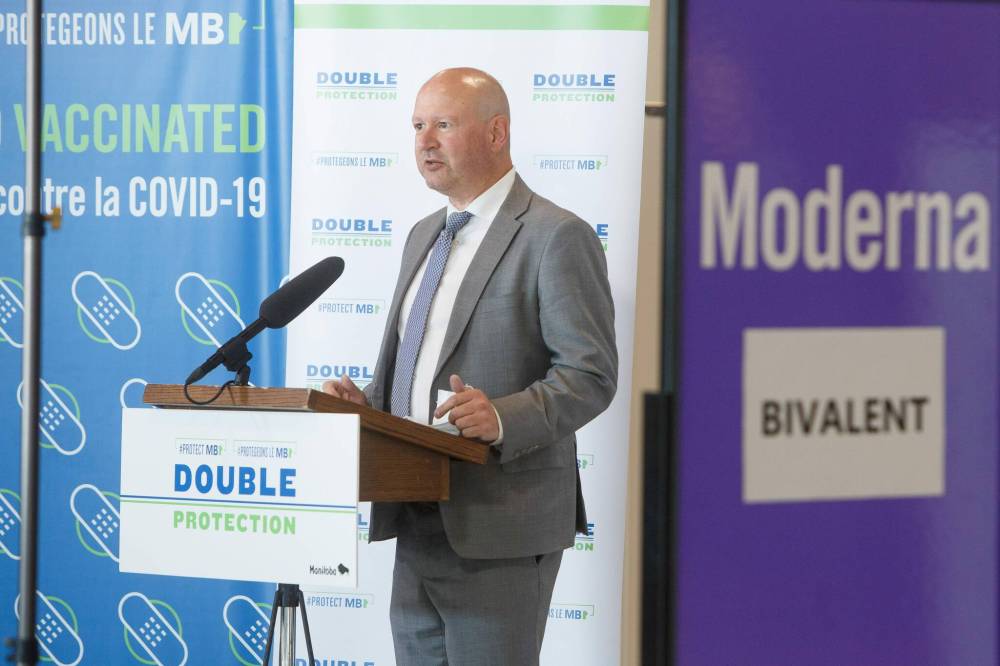
“You need to really assess your level of risk, assess the situation and know that we have a number of tools at our disposal should we choose,” he said.
Last week, Premier Heather Stefanson and Health Minister Audrey Gordon encouraged people to wear a mask if they have symptoms.
Eased over time, the province’s guidance also recommends masks for people who are at higher risk of severe outcomes of COVID-19 infection and those who are caring for someone who has tested positive or has symptoms.
Otherwise, it’s down to “personal preference.”
“Our messaging regarding masks hasn’t really changed,” said Roussin. “We’ve always said it’s certainly an option for people. If you feel you’re higher risk or just feel comfortable wearing a mask, that’s certainly an option for you.
“If you’re recovering from illness, if you have any symptoms, then we really want people to be wearing masks in those situations.”
“Our messaging regarding masks hasn’t really changed.”–Brent Roussin
According to the Opposition NDP, the “crisis” at Children’s Hospital demands a public briefing by Stefanson, Gordon and Roussin to tell Manitobans if there is a plan to ensure timely care for sick kids and provide information on topics such as vaccines.
The Tory government hasn’t scheduled a briefing, and it doesn’t appear it will any time soon.
“We want to continue the messaging and make sure we get the message out there,” said Roussin. “I’m not sure on the exact forum that will take, but we do want to be able to speak to Manitobans and keep them updated on where we’re at with this season. The forum, I’m not sure, has been decided.”
Roussin answered questions over the phone after the Free Press submitted an interview request to the province’s communications team.
Gordon wasn’t available for an interview after Tuesday’s throne speech because she was with guests, a spokesman said.
Roussin, meanwhile, said it’s hard to know why the respiratory virus season started early, but it mirrors that of Australia, where there was an early high peak of influenza A.
“It’s tough to know why exactly we haven’t seen the uptake in bivalent doses as we wanted. Some of that may be the interval between their last dose or the interval between having COVID.”–Brent Roussin
“The lack of exposure, for a number of years, to these viruses, especially for the youngsters, possibly plays a role in it,” he said. “This is a full respiratory season where Manitobans are not facing any restrictions and interacting as we have in the pre-pandemic years.”
There are signs of mostly a “plateau” with COVID-19 infection right now, he said.
“That certainly doesn’t mean we won’t see more COVID as things develop,” said Roussin.
While the number of flu shots administered so far this season is comparable to this time last year, Manitoba’s COVID-19 vaccine uptake has slowed almost two years after the first shots were administered.
About one in five eligible Manitobans (age six weeks and older) has had at least one dose of a vaccine in the six months up to Nov. 5, according to government data.
One in 10 people have rolled up their sleeves for a fourth shot — the Omicron-targeted bivalent booster — since becoming eligible.
Cumulative percent of people who have received a COVID-19 vaccine in Manitoba, by vaccination status, as of Nov. 6, 2022. (Health Canada)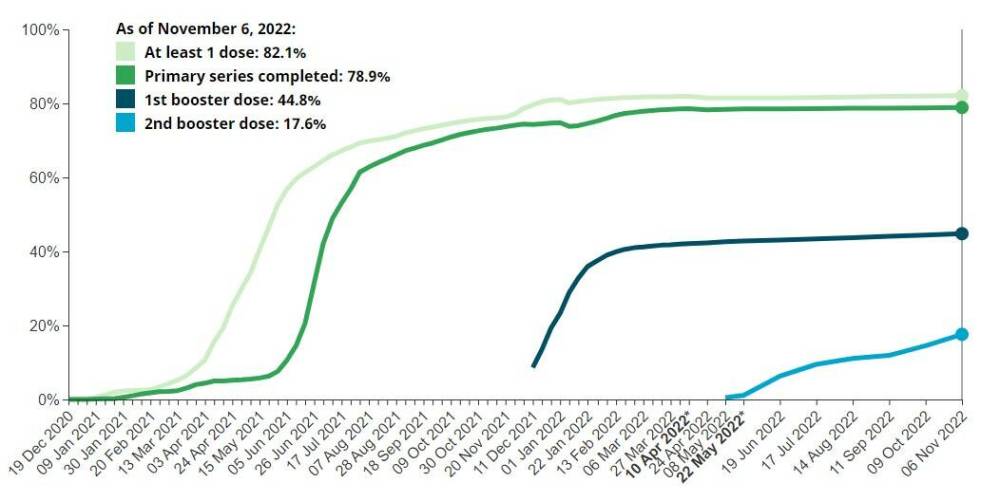
“We’d like to see those numbers improve over time,” said Roussin. “We still have fairly low uptake in all age groups, but certainly in the younger age groups.
“It’s tough to know why exactly we haven’t seen the uptake in bivalent doses as we wanted. Some of that may be the interval between their last dose or the interval between having COVID.”
COVID-19 vaccine uptake in each age category for children— six months to four years (eligible since August), five to 11 and 12 to 17 — is between seven and eight per cent in the last half year.
“It is crucial Manitobans go out and get their most updated and available vaccines,” said NDP health critic Uzoma Asagwara. “It’s also really important that the government do their part to make it as easy as possible for people to get vaccinated.”
A lack of “good” communication from the province has contributed to lagging uptake, the MLA for Union Station said.
Other factors include governments “moving on” from COVID-19 as a public issue, pandemic fatigue and misinformation spread by anti-vaccine figures or groups, said Thomas Linner, provincial director of the Manitoba Health Coalition.
This is problematic, said Linner, as new variants emerge.
“We know the pandemic is not over and it is still going to have impacts on our population and our health-care system,” he said.
chris.kitching@freepress.mb.ca
Twitter: @chriskitching
As a general assignment reporter, Chris covers a little bit of everything for the Free Press.
Our newsroom depends on a growing audience of readers to power our journalism. If you are not a paid reader, please consider becoming a subscriber.
Our newsroom depends on its audience of readers to power our journalism. Thank you for your support.
History
Updated on Tuesday, November 15, 2022 7:45 PM CST: fixes name spelling of Thomas Linner



